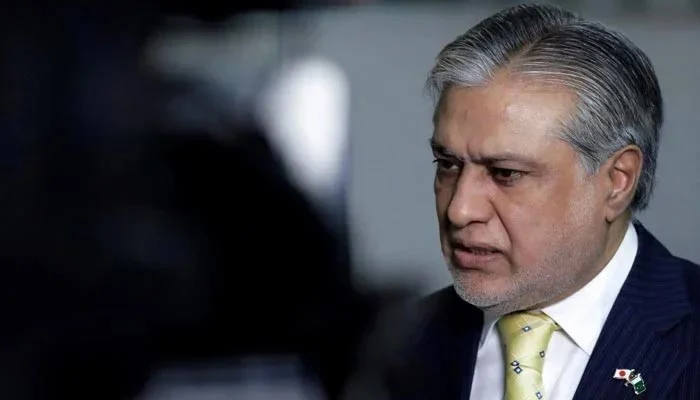- China, KSA will provide additional amount of $8.8bn and $4.2bn, respectively.
- During PM’s recent visits, China, KSA assured to take care of Islamabad’s financial requirements till June 2023, says Dar.
- China assured Pakistan that they would roll over $4 billion sovereign rollover deposits on all coming due dates, says Dar.
ISLAMABAD: China and Saudi Arabia have assured Pakistan of providing a financial package of $13 billion, with the former pledging $8.8 billion and latter $4.2 billion for the current fiscal year 2022-23.
This is in addition to the rollover of sovereign loan deposits, additional rollovers, commercial loans, additional SWAPS and jacking up oil facilities on deferred payment in line with the International Monetary Fund (IMF) agreement.
Both financial packages will ease the struggling economy of Pakistan as the foreign currency reserves held by the State Bank of Pakistan stand at $8.9 billion at the moment.
“China and Saudi Arabia have given assurances to Pakistani delegations under Prime Minister Shehbaz Sharif during recent visits that they will take care of Islamabad’s financial requirements till June 2023. Now the real effective exchange rate (REER) in terms of rupee against the US dollar has come down to Rs190 against the US dollar and no one will be allowed to play with our exchange rate,” Finance Minister Ishaq Dar told a select group of reporters in his office on Friday, The News reported.
The minister said that China assured Pakistan that they would roll over $4 billion sovereign rollover deposits on all coming due dates. The Chinese authorities, he said, also assured that the commercial loans of $3.3 billion will also be provided in due course of time. He said that China also granted a green signal for jacking up the SWAPS amount by providing an additional $1.45 billion so the total Chinese package would go up to $8.8 billion for the ongoing financial year. The Bank of China, he said, had already provided $200 million recently.
Dar said Pakistan and China agreed to resume the halted work on Mainline-1 from Karachi to Peshawar, which would be constructed at an estimated cost of $9.8 billion. He said that China also agreed to finance Karachi Circular Railway (KCR). He was of the view that the cost of ML-1 had gone up from $6.3 billion to $9.8 billion because of unwarranted delay in its execution during the tenure of PTI led regime. The minister said that China’s president and prime minister especially inquired about the health of PML-N leader Nawaz Sharif during this visit.
Sharing details about the outcome of Saudi Arabia’s visit, the minister said that they also assured to consider Pakistan’s request for additional $3 billion in deposits and jacking up the oil facility on deferred payment by an additional $1.2 billion. Besides, an additional amount of $4.2 billion would be considered by KSA authorities.
He said that KSA would also roll over existing deposits of $3 billion and their oil facility of $1.2 billion on deferred payment ($100 million on monthly basis) would continue till June 2023. Therefore, the total Saudi package is expected to touch $8.4 billion. To another query, the minister said that Saudi Crown Prince Muhammad Bin Salman is going to visit Pakistan within the ongoing month.
He said that Saudi Arabia would also construct a Petrochemical Complex in Gwadar at an estimated investment of $11 to $12 billion. It was agreed with the KSA in 2015 that it would construct an oil refinery at an estimated cost of $6 billion and he had offered to construct that in Hub because at that time Gwadar was not ready for providing the required infrastructure.
He said the government was also considering offering potential investment opportunities to KSA, including selling RLNG-based power plants. Dar said that the Asian Infrastructure Investment Bank (AIIB) was expected to approve $500 million as co-financing of ADB’s BRACE programme of $1.5 billion within the ongoing month.
He said the government would also convene a National Tax Council meeting next week for approving the GST harmonisation on goods and services among the Centre and the provinces, which is the only stumbling block in the way of approving $450 million RISE programme of the World Bank. There is another $500 million loan for Sindh, so the total disbursement of approximately $1.4 billion from WB was awaiting on harmonisation of GST for goods and services.

 Entertainment21 hours ago
Entertainment21 hours ago
 Latest News20 hours ago
Latest News20 hours ago
 Latest News20 hours ago
Latest News20 hours ago
 Latest News20 hours ago
Latest News20 hours ago
 Latest News20 hours ago
Latest News20 hours ago
 Latest News20 hours ago
Latest News20 hours ago
 Entertainment21 hours ago
Entertainment21 hours ago
 Latest News20 hours ago
Latest News20 hours ago






















